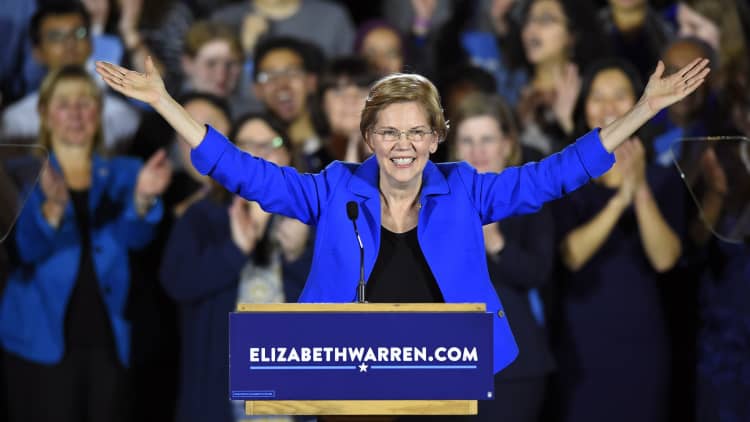Sen. Elizabeth Warren is following her own advice to fellow Democrats about rejecting money from political action committees to help fund their campaigns in the 2020 presidential election.
Warren, a liberal from Massachusetts, is closing her joint fundraising committee, the Elizabeth Warren Action Fund, as she explores a run for the White House, according to her chief spokeswoman, Kristen Orthman.
"We are in process of winding down Action Fund," Orthman said in an email.
The commitment to shut down the fund comes after Warren told MSNBC's Rachel Maddow on Wednesday that she believes candidates running for the party's nomination should avoid funding their campaigns through PACs.
She also said billionaires running for president should not self-fund their campaigns.

"I just mean that people should not be self-funding and they should not be funded from PACs from other billionaires," Warren said, urging candidates to use the primary process to get in touch with grassroots voters and activists. "Get out there, trust your message."
Her call for billionaires not to self-fund campaign operations follows CNBC's reporting that Democratic donor and former New York City Mayor Mike Bloomberg was prepared to spend more than $100 million on his own campaign organization if he were to run in 2020. Tom Steyer, a liberal billionaire from California, is also considering a run for president and will travel to the caucus and primary states of Iowa, New Hampshire and Nevada early this year.
The Iowa caucuses kick off the election season a year from now, but candidates are expected to announce their bids over the next several weeks. Democratic presidential candidates will start debating each other later this year.
Others who are considering running include former Vice President Joe Biden, Texas Rep. Beto O'Rourke, and Sens. Kamala Harris and Cory Booker.
The move by Warren to close her joint fundraising committee is significant in two ways.
On one hand, it means that Warren is likely limiting her ability to turn to big donors to help bolster her campaign if she were to officially jump into the race. The committee raised $4.9 million during Warren's 2018 Senate re-election campaign, according to the nonpartisan Center for Responsive Politics. It transferred $3.6 million to Warren's official campaign for Senate, which ended up raising $25 million and finished with $12.5 million on hand.
The PAC's top donors ranged from investment bankers to attorneys across the United States. Henry Goldberg, chairman of investment and asset management firm Artery Capital Group, donated $15,400 in August, according to a Federal Election Commission filing. Employees at class action and civil litigation law firm Berger Montague combined to give $35,800.
However, Warren's attempt to distance herself from the PAC is the latest example of her trying to appeal to the liberal, small-donor base of the Democratic Party, which historically has been against candidates turning to megadonors to influence their campaigns.
The issue was a major factor in one of the most-watched races of 2018. In deep-red Texas, O'Rourke made a point of shunning corporate donations and outside money as he nearly upset GOP Sen. Ted Cruz. O'Rourke still broke fundraising records as he raised more than $80 million during the campaign. A large chunk of that sum – $36 million – came from small donors, or people who gave $200 or less.
During the 2016 election, liberal Sen. Bernie Sanders of Vermont followed through with his promise of not accepting contributions from corporations. Part of his platform was focused on campaign finance reform.
While Sanders did win a number of state primaries, he ended up losing the nomination to Hillary Clinton. If Sanders runs in 2020, he will be following the same pledge he made the last time around.


